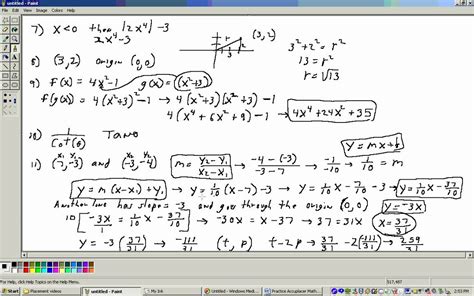Essential Preparation for a Smooth Transition to Higher Education
As you embark on your higher education journey, placement tests serve as a crucial step in determining your academic readiness. Whether you’re a high school graduate seeking admission to college or a student transferring from another institution, placement tests ensure that you’re placed in courses that align with your skills and abilities. Math placement tests, in particular, assess your foundational knowledge and problem-solving capabilities in mathematics, a subject that underpins numerous fields of study.

According to the National Center for Education Statistics (NCES), over 70% of students enrolled in two-year colleges take a math placement test, while approximately 50% of students in four-year colleges do the same. The results of these tests can significantly impact your course selection and academic trajectory, making thorough preparation essential.
Comprehending the Placement Test Structure
Math placement tests typically consist of multiple-choice questions that cover a range of topics, including:
- Algebra: Linear equations, inequalities, functions, graphing
- Geometry: Triangles, circles, polygons, coordinate geometry
- Precalculus: Trigonometry, exponential and logarithmic functions
- Calculus (for advanced tests): Limits, derivatives, integrals
The level of difficulty and the number of questions vary depending on the specific test you’re taking.
Strategic Tips for Success
To excel on your math placement test, consider these effective strategies:
- Review Thoroughly: Dedicate ample time to reviewing the topics covered on the test. Utilize textbooks, online resources, and practice problems to refresh your knowledge.
- Practice Regularly: Engage in consistent practice through online quizzes, mock tests, and past papers. This will enhance your fluency and build confidence.
- Identify Your Weaknesses: Take practice tests to pinpoint areas where you need improvement. Focus your efforts on strengthening these concepts through targeted study sessions.
- Manage Your Time Wisely: Develop a strategic approach to time management during the test. Allocate more time to questions you’re confident about and revisit challenging ones later.
- Stay Calm and Focused: Anxiety can be detrimental to your performance. Practice relaxation techniques and maintain a positive mindset during the test.
Common Mistakes to Avoid
To ensure optimal performance on your math placement test, steer clear of these common pitfalls:
- Rushing Through Questions: Avoid hasty decision-making. Read each question carefully and take the time to understand the concept being tested.
- Making Careless Errors: Pay attention to details and double-check your calculations to minimize silly mistakes.
- Leaving Questions Unanswered: Even if you’re unsure about an answer, make an educated guess. Leaving questions unanswered will result in lost points.
- Overreliance on Calculators: While calculators are permitted on some tests, don’t become overly dependent on them. Develop your mental math skills as well.
Sample Practice Problems
To give you a taste of what to expect on your math placement test, here are a few sample problems:
- Solve for x: 2x + 5 = 15
- Find the slope of the line passing through the points (2, 3) and (5, 9)
- Simplify the expression: (x^2 – 9) / (x + 3)
- Evaluate the integral of ∫x^2 dx
Frequently Asked Questions
1. How do I register for a placement test?
Contact the admissions office or testing center at your prospective institution for registration details.
2. How long does the test usually take?
Test duration varies, but it typically ranges from 60 to 120 minutes.
3. What resources are available for practice?
Many online platforms and textbooks provide practice tests and review materials.
4. How do I interpret my test results?
Your score on the math placement test will determine the level of math courses you’re eligible to take. Consult with your academic advisor or the admissions office for guidance.
5. Can I retake the test if I don’t do well?
Most institutions allow students to retake the placement test after a certain period of time. Check with your prospective institution for specific policies.
6. What happens if I place into a lower-level math course than I expected?
Taking a lower-level course can provide a strong foundation and strengthen your mathematical skills. You can typically progress to higher-level courses after demonstrating proficiency.
Conclusion
Math placement tests play a pivotal role in determining your academic pathway in higher education. By adopting a proactive approach to preparation and employing effective strategies, you can increase your chances of achieving a strong score and securing the math courses that align with your academic aspirations. Remember, with perseverance and diligent practice, you can conquer your math placement test and embark on a successful college journey.
